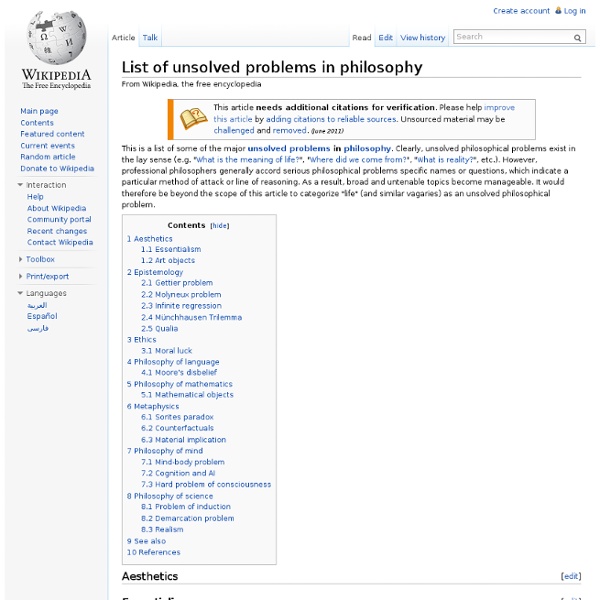Solipsism
Solipsism ( i/ˈsɒlɨpsɪzəm/; from Latin solus, meaning "alone", and ipse, meaning "self")[1] is the philosophical idea that only one's own mind is sure to exist. As an epistemological position, solipsism holds that knowledge of anything outside one's own mind is unsure; the external world and other minds cannot be known and might not exist outside the mind.
List of thought processes
Nature of thought[edit] Thought (or thinking) can be described as all of the following: An activity taking place in a: brain – organ that serves as the center of the nervous system in all vertebrate and most invertebrate animals (only a few invertebrates such as sponges, jellyfish, adult sea squirts and starfish do not have a brain). It is the physical structure associated with the mind. mind – abstract entity with the cognitive faculties of consciousness, perception, thinking, judgement, and memory. Having a mind is a characteristic of humans, but which also may apply to other life forms.[1][2] Activities taking place in a mind are called mental processes or cognitive functions.computer (see automated reasoning, below) – general purpose device that can be programmed to carry out a set of arithmetic or logical operations automatically. Types of thoughts[edit]
Allegory of the Cave
Plato realizes that the general run of humankind can think, and speak, etc., without (so far as they acknowledge) any awareness of his realm of Forms. The allegory of the cave is supposed to explain this. In the allegory, Plato likens people untutored in the Theory of Forms to prisoners chained in a cave, unable to turn their heads.
Timeline of Western philosophers
A wide-ranging list of philosophers from the Western traditions of philosophy. Included are not only philosophers (Socrates, Plato), but also those who have had a marked importance upon the philosophy of the day. The list stops at the year 1950, after which philosophers fall into the category of Contemporary philosophy. Western and Middle Eastern philosophers[edit] Classical philosophers[edit]
An Essay by Einstein
"How strange is the lot of us mortals! Each of us is here for a brief sojourn; for what purpose he knows not, though he sometimes thinks he senses it. But without deeper reflection one knows from daily life that one exists for other people -- first of all for those upon whose smiles and well-being our own happiness is wholly dependent, and then for the many, unknown to us, to whose destinies we are bound by the ties of sympathy.
Pascal's Wager
Blaise Pascal Pascal's Wager is an argument in apologetic philosophy which was devised by the seventeenth-century French philosopher, mathematician, and physicist Blaise Pascal (1623–1662). It posits that humans all bet with their lives either that God exists or does not exist. Given the possibility that God actually does exist and assuming the infinite gain or loss associated with belief in God or with unbelief, a rational person should live as though God exists and seek to believe in God.
Some Moral Dilemmas
The Trolley Problem, not in Grassian. Suggested by Philippa Foot (1920-2010), daughter of Esther, the daughter of President Grover Cleveland, but of British birth because of her father, William Sidney Bence Bosanquet. A trolley is running out of control down a track. In its path are five people who have been tied to the track by a mad philosopher. Fortunately, you could flip a switch, which will lead the trolley down a different track to safety. Unfortunately, there is a single person tied to that track.
Zombies
First published Mon Sep 8, 2003; substantive revision Thu Mar 17, 2011 Zombies in philosophy are imaginary creatures used to illuminate problems about consciousness and its relation to the physical world. Unlike those in films or witchraft, they are exactly like us in all physical respects but without conscious experiences: by definition there is ‘nothing it is like’ to be a zombie. Yet zombies behave just like us, and some even spend a lot of time discussing consciousness. Few people think zombies actually exist. But many hold they are at least conceivable, and some that they are possible.



